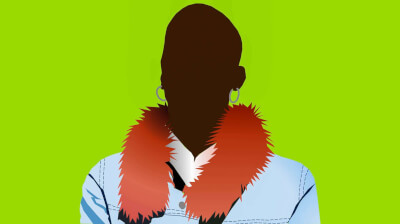Sean Bowie grew up in Knoxville, Tennessee. As a young adult, he set course for Los Angeles to work and learn alongside eccentric experimental artist Mikki Blanco. During this time, Bowie began expanding his production under the name Yves Tumor. In 2016, he released “Serpent Music,” and it has been impossible to pinpoint his sound ever since. He has a gravitational pull on intricate polyrhythms and complex compositions. The instrumentals are a blast outward while each transition is the switch of a dial attempting to reach the wavelength of its counterpart. He called his own album “dystopian” and “spiritual.” “Role In Creation” sounds like a forest sprouting into a jungle. Tumor weaponizes abrasive drum patterns and tribal claves before sprinkling whispers and flutes over delicate wind chimes. On “The Feeling When You Walk Away,” his voice crawls out of wreckage like a lonely folk singer slinking across a cold guitar. In 2017, he released the glassy-eyed single “Limerence.” It is as if Tumor reworked a Pino Donnagio score where piano keys tap dance like drizzling rain. His diversified and unpredictable catalog makes him one of the most adventurous artists of our time.
Tumor’s newest record, “Safe In The Hands Of Love,” echoes this sentiment and maintains its fearless grip on an elusive and disgustingly beautiful sound. The cosmogram was an important symbol in the spiritual practices of traditional Kongo civilization. The Kongos are a group of Africans historically concentrated in the continent’s center. This symbol is the perpetual balancing of the energies in this living world with the spirit of the physically diseased.”Safe in The Hands Of Love“ spans a pluralism of unpredictable emotions, each layered with Tumor’s touch and stylistic sensibility. It is a genre-evading exploration of the avant-garde.
Historian Robert Farris Thompson defines a cosmogram as “the symbol of a system of continuity. One’s peak strength on the earth converges with the summit while the highest point of one’s otherworldly strength equals the bottom.”
But who really is Yves Tumor? His diverse catalog shrouds him in smoke, obscuring and thus liberating a fixed sense of self. Each record is tailored for contradiction and conflation, he zigs when you expect him to zag. Tumor has impressively managed to protect an identity that transcends visibility while still covering himself with fur, spikes and gigantic hoop earrings. His mysticism mimics Maison Martin Margiela giving Paris Fashion Week a revolutionary debut collection, then refusing to reveal himself and denying all personal publicity. Tumor’s uniquely fluid sense of style oozes out of every press photo, yet it still feels as if he’s spent a short career switching masks while never unveiling his face. His exact age has never been officially reported. When Pitchfork asked if he felt part of the conversation about race, gender and sexuality, he refused to conflate his artistic motivations with political posturing.
“I really like to drop hints in the way I express myself, instead of making my gender or my sexuality or my feelings about equality my personal brand. That’s not why I do what I do.” Tumor said in his interview with Pitchfork.
Throughout “Safe In The Hands Of Love,” Tumor aggressively fights the impending pressure of the outside world. He is trying to overpower the earth with sound and crunch its dimensions in order to fold them into more favorable conditions. The tense hisses, screeches and glitches all serve to apply physical pressure to his vocals. His constrained singing is nearly held to a whisper as he lightly drags through each syllable. It sounds as if at any second he could dissolve and disappear from the record entirely. Tumor leans into a warped and eclectic sense of pop, not unlike his late contemporary Lil Peep. The track “Economy of Freedom” sounds like automated machines opening and closing until it ignites into a modern R&B beat. “Honesty” mutates into something between acid house and Chicago footwork. “Noid” is a horrifically freaked out version of pop-rock like Jimmy Hates Jazz. The record’s best track, “All The Love We Have Now,” breaks my brain every time I hear it.
There is a certain stiffness that comes with artists who carve out purpose through the simple imposition of an explicit identity. Their work serves to suggest they are a projection of their group, and if you don’t support them, you are problematic. The algorithm breaks when an artist displaces or even removes their identity from the equation. Do fans still have the instinctive tools to locate their humanity? Are audiences still willing to be challenged with the sometimes uncomfortable process of having a work speak for its creator, instead of the inverse? Yves Tumor amplifies this dynamic by keeping himself in the dark. He absorbs then deflects the spotlight back at his listener as if to ask, “Can you handle this?”
![]()




































